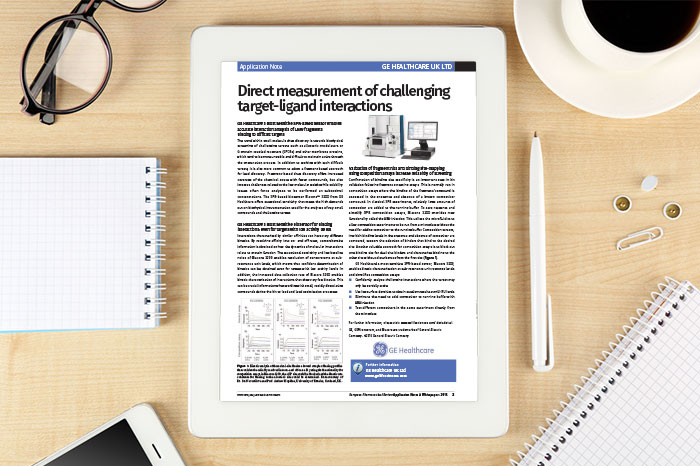Application Note: Direct measurement of challenging target-ligand interactions
Posted: 11 January 2016 | GE Healthcare | No comments yet
GE Healthcare’s most sensitive SPR-based sensor enables accurate interaction analysis of LMW fragments binding to difficult targets.
The trend within small molecule drug discovery is towards biophysical screening of challenging targets such as allosteric modulators or G-protein coupled receptors (GPCRs) and other membrane proteins, which tend to be more unstable and difficult to maintain active through the preparation process. In addition to working with such difficult targets, it is also more common to adopt a fragment-based approach for lead discovery. Fragment-based drug discovery offers increased coverage of the chemical space with fewer compounds, but also imposes challenges related to the low molecular weight while solubility issues often force analyses to be performed at suboptimal concentrations. The SPR-based biosensor Biacore™ S200 from GE Healthcare offers exceptional sensitivity that meets the high demands put on biophysical instrumentation used for the analyses of very small compounds and challenging targets.
This application note is restricted - login or subscribe free to access


Why subscribe? Join our growing community of thousands of industry professionals and gain access to:
- bi-monthly issues in print and/or digital format
- case studies, whitepapers, webinars and industry-leading content
- breaking news and features
- our extensive online archive of thousands of articles and years of past issues
- ...And it's all free!
Click here to Subscribe today Login here
Related content from this organisation
- Alzheimer’s therapeutics market to reach $6.8 billion by 2032
- Biopharmaceutical bioseparation systems market to value $20bn
- Cell line development services market to value $2.4 billion by 2030
- ebook: Important considerations for every bio-pharmaceutical microbiology QC lab
- Global nebulisers market to decline after COVID-19






